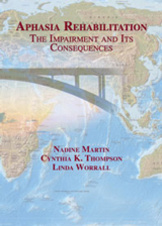Publication
Aphasia Rehabilitation: The Impairment and Its Consequences
- Details:
- 277 pages, Illustrated (B/W), Softcover, 6 x 9"
- ISBN13:
- 978-1-59756-162-4
- Release Date:
- 11/01/2007
Overview
As a consequence of the disability movement, the thinking generated by the World Health Organizations classification of disability and functioning, and an upturn in concern for the long-term consequences of aphasia, it has become apparent that two distinctive pathways for the treatment of aphasia have emerged over the past decade. The first (and most traditional) involves assessment and management directed toward lessening the effects of the impairment of aphasia, while the second pathway focuses less on specific language than on the psychosocial consequences of aphasia. This unique text specifically contrasts impairment- and consequences-focused treatment with the aim of providing clinicians with a level playing field that permits them to evaluate for themselves the relative contributions that each approach provides, to evaluate their relative strengths and weaknesses, and finally to seek common ground.
An opening chapter sets the scene, while the heart of the book, based on real cases, concerns five meticulously described, yet hypothetical individuals with aphasia. In each of the cases, detailed descriptions and assessment results are provided and clinical management plans, representing each approach, are presented by internationally recognized experts in aphasia rehabilitation.
Review
Kerry Lenius, PhD, CCC-SLP, Florida State University, Doody's Review Service:
"This book is unique in that it discusses two theoretical approaches to aphasia rehabilitation. To my knowledge there are no other books on the market that present both types of approaches in a collaborative way. I would highly recommend this both for graduate students planning evidence-based treatment in supervised learning environments and experienced clinicians who want to learn about the distinctions and benefits of each treatment approach."
- SECTION I
- 1. Approaches to Aphasia Treatment
- Cynthia K. Thompson and Linda Worrall
- SECTION II
- 2. A Case of Fluent Aphasia
- Anna Basso and Audrey L. Holland
- 3. Treatment for Fluent Aphasia from a Cognitive-Impairment Perspective
- Anna Basso
- 4. Concentrating on the Consequences: Consequence-Oriented Treatment for MS
- Audrey L. Holland
- 5. Impairment and Life Consequences Approaches for Fluent Aphasia: Convergences and Divergences
- Audrey L. Holland and Anna Basso
- SECTION III
- 6. A Case of Severe Apraxia of Speech and Aphasia
- David Howard and Nina Simmons-Mackie
- 7. Intervention for a Case of Severe Apraxia of Speech and Aphasia: A Functional-Social Perspective
- Nina Simmons-Mackie
- 8. Treatment for a Case of Severe Apraxia of Speech and Aphasia: An Impairment-Based Perspective
- David Howard
- 9. Impairment and Functional-Social Approaches for Severe Apraxia of Speech and Aphasia: Convergences and Divergences
- Nina Simmons-Mackie and David Howard
- SECTION IV
- 10. A Case of Nonfluent Aphasia and Agrammatism
- Cynthia K. Thompson and Linda Worrall
- 11. Impairment-Based Treatment for Agrammatism from a Neurolinguistic Perspective
- Cynthia K. Thompson
- 12. Intervention for Agrammatism from a Consequences Perspective
- Linda Worrall
- 13. Impairment and Life Consequences Approaches for Treatment of Nonfluent Aphasia with Agrammatism: Convergences and Divergences
- Linda Worrall and Cynthia K. Thompson
- SECTION V
- 14. A Case of Anomic Aphasia
- Nadine Martin and Jacqueline Hinckley
- 15. Intervention for Anomic Aphasia from a Functional Perspective
- Jacqueline Hinckley
- 16. Intervention for Anomic Aphasia from a Cognitive Impairment-Based Perspective
- Nadine Martin
- 17. Cognitive and Functional Interventions for Anomic Aphasia: Convergences and Divergences
- Jacqueline Hinckley and Nadine Martin
- SECTION VI
- 18. A Case of Letter-by-Letter Reading
- Linda Garcia
- 19. A Treatment Plan for a Letter-by-Letter Reader: Intervention from an Integrated Perspective
- Linda Garcia
- 20. The State of Impairment- and Consequences-Based Approaches to Treatment for Aphasia: Final Commentary
- Argye Hillis, Linda Worrall, and Cynthia K. Thompson
- Index
About The Authors
Nadine Martin, PhD, is an Associate Professor of Communication Sciences and Disorders at Temple University and is Director of the Eleanor M. Saffran Center for Cognitive Neuroscience.
Cynthia K. Thompson, PhD is a Professor in the Department of Communication Sciences and Disorders, the Department of Linguistics, and the Department of Neurology at Northwestern University.
Linda Worrall, PhD, is the co-director of the Communication Disability Centre within the School of Health and Rehabilitation Sciences, The University of Queensland, Australia.
Contributors
Anna Basso
Argye Hillis
Linda Garcia
Nina Simmons-Mackie
Related Titles
Neuroimaging in Communication Sciences and Disorders
243 pages, Color Illustrations (4 Color), Hardcover, 8.5 x 11"
Neurogenic Communication Disorders
Barbara B. Shadden, Fran Hagstrom, Patricia R. Koski
257 pages, Illustrated (B/W), Softcover, 7 x 10"
Brain-Based Communication Disorders
Leonard L. LaPointe, Bruce E. Murdoch, Julie A. G. Stierwalt
265 pages, Color Illustrations (4 Color), Hardcover, 7 x 10"
Speech Practice Material
349 pages, Illustrated (B/W), Softcover, 8.5 x 11"
Aphasia Couples Therapy (ACT) Workbook
132 pages, Illustrated (B/W), Softcover, 8.5 x 11"
Head Injury Recovery in Real Life
Larry E. Schutz, Michael E. Schutz
349 pages, Illustrated (B/W), Softcover, 6 x 9"
Head Injury Recovery in Real Life Bundle
Larry E. Schutz, Michael E. Schutz
1,175 pages, Illustrated (B/W), Softcover, 6 x 9"
An Advanced Course in Communication Sciences and Disorders
288 pages, Available Online Only
Mild Traumatic Brain Injury
Richard J. Roberts, Mary Ann Roberts
337 pages, Illustrated (B/W), Softcover, 6 x 9"
Adult Audiologic Rehabilitation
Edited by: Joseph J. Montano, Jaclyn B. Spitzer
608 pages, Illustrated (B/W), Hardcover, 8.5 x 11"
Anatomy and Physiology Study Guide for Speech and Hearing
William R. Culbertson, Stephanie C. Christensen, MA, CCC-SLP, Dennis C. Tanner
416 pages, Illustrated (B/W), Softcover, 8.5 x 11"
Group Treatment of Neurogenic Communication Disorders
Edited by: Roberta J. Elman
383 pages, Illustrated (B/W), Softcover, 7 x 10"
Voice Science, Acoustics, and Recording
David M. Howard, Damian T. Murphy
206 pages, Illustrated (B/W), Hardcover, 7 x 10"
























